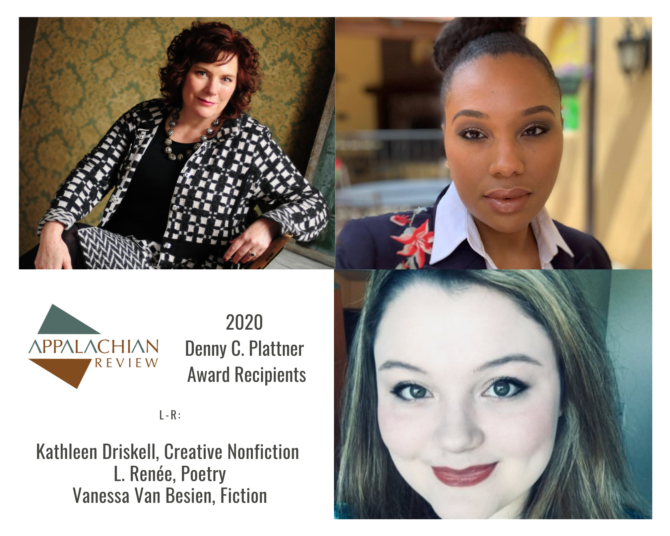David Joy‘s debut novel Where All the Light Tends to Go hit…

2020 Denny C. Plattner Awards
We are proud to announce the winners of the annual Denny C. Plattner Awards, which were established in 1995 by Kenneth and Elissa Plattner to honor their late son and his love of writing. The awards are given to the finest pieces of fiction, creative nonfiction, and poetry that appeared in Appalachian Heritage during the previous year. Winners receive a $200 prize, and both winners and honorable mentions are awarded a piece of handsome ceramics designed and manufactured by Berea College Crafts.
FICTION
Judged by Karen Salyer McElmurray, author of Wanting Radiance
Winner: Vanessa Van Besien, “Milk”
Honorable Mention: Jayne Moore Waldrop, “For What It’s Worth“
McElmurray on Van Besien’s story: “Milk” is made of rust and bruised skin, of hurt and memory. Its protagonist, a damaged girl named Bean, is set down hard in the midst of the almost forgotten ways that might, just might, offer her a tenuous hope.
CREATIVE NONFICTION
Judged by Shawna Kay Rodenberg, author of Kin: A Memoir
Winner: Kathleen Driskell, “Keats in Your Time of Pandemic“
Honorable Mention: Denise Giardina, “Socks & Junior”
Rodenberg on Driskell’s essay: Reading Kathleen Driskell’s “Keats in Your Time of Pandemic” is like wandering the rooms of an expansive heirloom dollhouse—each door leads to another sumptuously detailed and surprising tableau, each tableau points to yet another hidden door. Deeply intimate but sublimely devoid of egotism, Driskell grapples here with the encroaching proximity of death and unsettling interiority characteristic of quarantine for both the collective and the individual. Her extraordinary essay yanks the proverbial dusty curtains from their rods, illuminating all the dark rooms of the past year.
POETRY
Judged by Jeremy Paden, author of World as Sacred Burning Heart
Winner: L. Renée, “Gone“
Honorable Mention: Benjamin Cutler, “The River”
Paden on L. Renée’s poem: “Gone” by L. Renée finds a way merge narrative poetry with a lyric intensity that both focuses on tragic particulars, like the death of sister Velma, or her stillborn twin, and pulls back to offer gnomic summations on life. “We can’t sing with certainty about our men,” L. Renée writes near the end. And no, “there is no hymn,” nor form to contain all the “living losses” suffered, but L. Renée finds a way to work long, heavy lines into couplets where flashes of lyrical grief burn brightly even as they are tucked away in long lines. Form works against expectation to push into a deeper meaning that gives expression to the grief.
